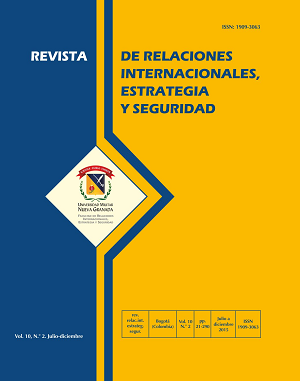Cultural diplomacy in internactional business: World religions
Abstract
This document general purpose is to present behavior, professional experiences and reflections of characters to make a deliberation on the incursion of religion, global ethics in relation to cross-cultural international negotiations; mainly focusing on the positive and tangible side of the religious and corporate social responsibility (CSR); it was shaped under the qualitative paradigm and the hermeneutic approach. The method is documentary and descriptive. the first one, by the consultation made to different scientific documents on the internet; and the second one because of the information found on the web was extracted, described and interpreted the most transcendent of specific cultures, personalities and organizations. Bearing in mind that those who know a single cultural representation, argue that they could have a knowledge of other cultural characteristics, when in reality it is not so. Centuries ago the religions already offered standards of conduct and values people implement in their daily living and even to the local and international free trade. For this reason people of different dogmas (Hindu, Christian, Islamic, Buddhists, etc.) want to know how they can implement their beliefs for the business environment for a better understanding between the parties and create synergies between them (religion-culture-trade).
Downloads
Languages:
esReferences
Aureoles, K. (2012). Cultura y negocios internacionales. Recuperado de https://prezi.com/xxn6yipfrkta/cultura-y-negocios-internacionales/
Ball, D. & Culloch W. (1997). Negocios internacionales. Introducción y aspectos esenciales. México: Mc Graw Hill.
Fernández, R. (2009). Responsabilidad social corporativa. Alicante: Editorial Universitaria.
Gandhi, M. (1930). Rethinking the possibility of Non-violence. Recuperado de http://www.mkgandhi.org/articles/nonviolence1.htm
Global Ethics, Religion and International Business (2013). EENI. Recuperado de http://en.reingex.com/Religion-Ethics-Business.shtml
Lee, C. (2013). Does religion affect international trade in services more than trade in goods? Applied Economics Letters, 20(10), 998-1002, doi: 10.1080/13504851.2013.770120 http://dx.doi.org/10.1080/13504851.2013.770120
Lenski, G. (1967). El factor humano, Barcelona: Labor.
Los Efectos de la Religión en la Economía. (2006). Redes cristianas. Recuperado de: http://www.redescristianas.net/2006/08/21/los-efectos-de-la-religion-en-la-economia/
Morales, E. (2013). La Religión y los Negocios Internacionales. Recuperado de: http://lareligionylosnegociosinternacionales.blogspot.com/
Molero, V. (2006). Generación marketing. La sociedad entre la codicia y la indolencia. Madrid: Esic.
Nonell, P. (2013). Ética global, religiones y negocios internacionales. Recuperado de: http://www.reingex.com/Religion-Etica-Negocios.shtml
Pontara, G. (1996). Introducción. En M.K. Gandhi, Teoria e pratica della non-violenza. Torino: Einaudi.
Smart, N. (1989). Las religiones del mundo. Madrid: Akal.
Sri Ramakrishna (1903), The Sayings of Sri Ramakrishna New York: The Vedanta Society, Recuperado de: http://www.estudantedavedanta.net/Sayings%20of%20Sri%20Ramakrishna.pdf
Status of women on Sikhism, (2005). SikhWomen.com Recuperado de: http://www.sikhwomen.com/Guru_Quotes/women.htm
Tata (1998). Ethical conducts Claude Recuperado de: http://www.tata.com/aboutus/articlesinside/Tata-Code-of-Conduct












